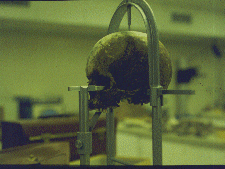
 |
ANT 211
Fundamentals of Forensic Anthropology
Defining Forensic Anthropology
(page 4 of 5)
II. What is a forensic anthropologist?
Forensic means "legal." Anthropology means "the study of humans." Within the specialized area of osteology, the study of bones, comes the application of methods and techniques of recovering human remains (buried, scattered) and analyzing the bones to cases of legal importance. Cases of legal importance include homicide, suicide, mass disaster (plane crash, train wreck, war, earthquake, tornado, etc.) or any situation where there was sudden and or unexpected death(s).

Osteological analyses yield clues as to how populations of people might have lived, how old they were when they died, if they were female or male, their state of health (or disease), types of trauma they may have experienced--either during life or around the time of death, and any other factors of climate, warfare, or occupation that may leave their mark on the bones.

When we apply methods of studying the skeleton to cases of unknown modern remains, we are using osteology in a legal context; therefore, we are practicing forensic anthropology. Forensic anthropology is about the proper recovery of human remains, analysis to determine identity, and analysis of pathology (trauma/disease) as evidenced on the bones.